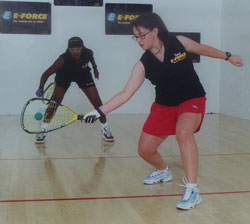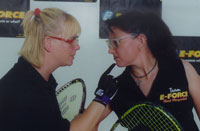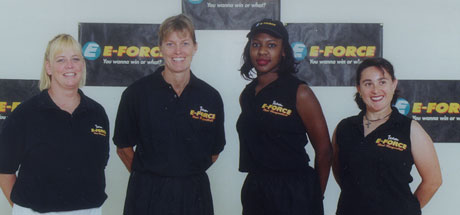
November - December 2001
Vol. 12, No. 6 | Contents
by Kelley Beane
Photos by John Foust
The President's Fitness Council cites that, today, one in three girls are involved in a high school athletic activity, compared to 1 in 27 in 1971. While that is substantially better, it still leaves two-thirds of the girls without a sport.
 Actually, the numbers of women playing sports have still not improved, even
since the inception of Title IX. There are women, like me, who love to compete
and don’t care about results. Win or lose we come back for more each week.
Unfortunately, there are many women who may start racquetball but stop playing
due to a poor experience or lack of motivation.
Actually, the numbers of women playing sports have still not improved, even
since the inception of Title IX. There are women, like me, who love to compete
and don’t care about results. Win or lose we come back for more each week.
Unfortunately, there are many women who may start racquetball but stop playing
due to a poor experience or lack of motivation.
One problem is cultural. While boys are trained to compete at a young age, many girls start playing organized sports two years later than boys do. When these girls go to compete, they don’t have the sports skills and may quit because they’re not having fun. It’s fun to make a shot and it’s fun to be good at something. At five, girls that begin playing racquetball can play a game of multi bounce and be very good at it within six weeks. Many girls in our programs at the Executive Club in Manchester, New Hampshire, succeed even though these children did not do well at other sports. If the number one reason kids play sports is to have fun, then we have to do a better job at making sure kids — and specifically girls — have fun.
Some facts to consider: The President's Fitness Council cites that, today, one in three girls are involved in a high school athletic activity, compared to 1 in 27 in 1971. While that is substantially better, it still leaves two-thirds of the girls without a sport. In high school, many girls tend to lose their assertive, energetic and “tomboy” personalities to work at becoming popular with boys. In 1989 a survey showed that of all the female executives at Fortune 500 companies, 80% identified themselves as having been a tomboy. These facts lead to an inevitable conclusion. To develop leaders and better adults, more girls need to play sports. Racquetball is a great arena for girls and women to test their abilities, to solve problems, learn new skills, and experience success; all while getting a great workout and having fun. Racquetball is also a great way to challenge oneself, take risks, and boost self-esteem.
 In a study done by IRSA, women stated they
play sports to have fun, improve their skills, be with friends, and get in
shape, while enjoying the challenges of athletic competition. What is
interesting is that women are more process-oriented and men seem to be more
motivated by outcome. Women try to accomplish these goals by learning to
cooperate with one another. So women tend to prefer activities which allow them
to work together to improve or function cooperatively, rather than being
competitive. This why women’s programming needs to be socially-oriented, such as ladies
drill nights, socials or group lessons with friends. That's why the “in your face” behavior being
modeled here tends to be rare among women!
In a study done by IRSA, women stated they
play sports to have fun, improve their skills, be with friends, and get in
shape, while enjoying the challenges of athletic competition. What is
interesting is that women are more process-oriented and men seem to be more
motivated by outcome. Women try to accomplish these goals by learning to
cooperate with one another. So women tend to prefer activities which allow them
to work together to improve or function cooperatively, rather than being
competitive. This why women’s programming needs to be socially-oriented, such as ladies
drill nights, socials or group lessons with friends. That's why the “in your face” behavior being
modeled here tends to be rare among women!
As well as programming to strengths, recreation directors need to motivate women. Realizing that they may be more critical of each other and point out weaknesses, a club pro or programmer may create more non-competitive situations. Women may also confuse outcomes with worthiness and therefore not be able to “let go” of a loss, whereas men may just move on and forget. Women need to be taught to compete for challenges and how to win and accept defeat graciously. Clubs can give women leagues, tourneys and even socials, but what they really need is support, encouragement and motivation.
It’s common to find ladies who play racquetball but don’t play competitive tournaments. They compete, but not directly. Their success is not measured by confrontation with the opponent, or by being imposing. They mask their competitiveness with nicety as so not to appear aggressive. It is not considered feminine to have a killer instinct, or to want to win. There shouldn’t be such a division between being beautiful and sexy and being athletic and strong. It should be great to go out and kick a guy’s butt on the court and afterwards be able to let your hair down and still be a woman!
Some of us are born to compete. We are the people who need to go out and make a difference in someone’s life. We can do this by introducing people to the sport or by helping them reach a point where playing tournaments will be fun. There are fewer women players out there. There are even fewer women coaches. I realized that you don’t need to be a world champion to be successful. There is no greater joy than helping someone bursting with enthusiasm. Join us in spreading the word to women and girls of all ages that it’s okay to be strong, confident, and athletic. It’s time for all of us to step up and be a positive role model and let racquetball make a difference in their lives. It sure did for us!

Author Kelley Beane (pictured second from left) is an accomplished player and coach. Currently she is serving as an assistant junior team coach for Team USA. She also has served as team leader in the tourney of the Americas and the prestigious Pan American Games in Winnipeg, Canada. She also runs very successful juniors and ladies league programs at the Executive Club in Manchester, New Hampshire.
Team E-Force members Rosy Torres of Rosarito Beach, Mexico (far right) and Ann Doucette of Berwick, Maine (far left), and Nathania Stewart of Atlanta, Georgia (second from right) assisted with the photos. Photos by: John Foust.
Top | Racquetball Online | USRA
© United States Racquetball Association
All Rights Reserved